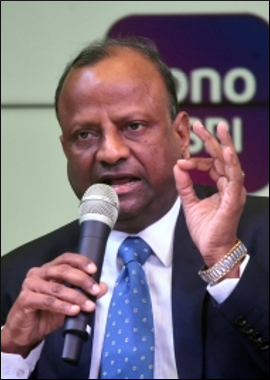|
|
|

|
For growth to sustain, infra push, direct transfers must go hand-in-hand: former SBI Chairman
|
|

|
|
| Top Stories |
 |
|
|
|
Animesh Deb | 21 Dec, 2021
The infrastructural push, as well as direct benefit transfers into the
hands of the people are key to keep the greenshoots and recent economic
momentum sustainable and intact going ahead, said State Bank of India's
former Chairman Rajnish Kumar.
In an exclusive interaction with IANS, he stressed that these two measures must go hand-in-hand.
"There
are two issues. One is about stepping up infrastructure spending.
Already the projects have been identified. There is a national
infrastructure pipeline, but the investment needs to be stepped up to
make it attractive for private sector to participate. Second is, of
course, how does the government put more money in the hands of the
people to create demand. That is a bigger challenge although the
government has done a lot for creating demand, particularly all the
direct benefit transfers, and the money which has been spent on the
social welfare schemes," he said.
The spending created demand in the rural sectors, said Rajnish Kumar.
On
his take on cryptocurrency, which at present is the talk of the town,
the former banker said: "Crypto... one is that there is a struggle with
all the governments across the world on how they define it and how to
treat it. Same is happening in our country and there is a huge debate
around it."
The Centre plans to introduce Cryptocurrency and
Regulation of Official Digital Currency Bill, 2021, in the ongoing
Winter Session of the Parliament.
"One is that you outright ban
it... and second is that you don't outright ban it but define it... It
is ruled out that it will be defined as a currency... that is ruled
out," he said.
Besides, it is not a commodity, so the only choice
remaining is, if at all, the government makes it legal, then it will
have to be put under the crypto asset in digital form, he opined.
Aked
that if trading in crypto is allowed, who could be the potential
regulator, he said that if it is an asset and there is trading and
exchanges involved, then obviously it has to be the market regulator
Securities Exchange and Board of India.
On demonetisation, he said that it helped in formalisation of the Indian economy.
To
put it into perspective, digital payments in India have risen
exponentially in the past few years, which is an apparent indicator of
the formalisation, he said.
Asked about whether the target of
formalisation of the economy has been achieved, he said: "Was that the
target I don't know. But the outcome is that we have seen more people
into the tax system and the formalisation has got a boost."
Rajnish Kumar became Chairman of the SBI on October 7, 2017 and his three year term ended in October 2020.
On
how proposed privatisation of two public sector banks will help the
overall banking sector, he said: "Basically, the government's intent is
that the private capital would play a role in what they call the
strategic sectors. Government says four or five entities are in the
strategic sector. Banking is a strategic sector and the same is true for
all other strategic sectors. So, as a part of that the privatisation of
two banks should be seen."
With financial literacy playing a
vital role in making a shift to the digital economy, and with rising
cyber crimes, it has become even more important for the people, Rajnish
Kumar, asked whether India needs a proper financial literacy programme
for masses or on a large scale, given its low level of financial
literacy, said that India is a large country and whatever it does has to
be done on a massive scale.
"Financial literacy has increased
because people now have bank accounts and they are operating on those
accounts and they are aware," he said.
However, a proper financial literacy programme is needed, he said.
Rajnish
Kumar had recently published a book titled "The Custodian of Trust - A
Banker's Memoir", which he started writing after his 40-year service. In
the book, he delved about his experiences and some of the contemporary
issues facing the banking sector.
He feels that the book has to offer many lessons for all, and especially for people working with the SBI.
"For
the people who are working, say in SBI, there are many lessons for them
in the book... In a way, it will be the readers who will determine what
they should be looking at in the book. But, there is something for
everyone in the book."
|
|
|
| |
|
|
|
|
|
|
|
|
|
|
|
|
|
|
| |
| Customs Exchange Rates |
| Currency |
Import |
Export |
US Dollar
|
₹91.2
|
₹89.5 |
UK Pound
|
₹123.35
|
₹119.35 |
Euro
|
₹107
|
₹103.35 |
| Japanese
Yen |
₹57.9 |
₹56.1 |
| As on 22 Jan, 2026 |
|
|
| Daily Poll |
 |
 |
| What is your primary "Make or Break" expectation from the Finance Minister this year? |
|
|
|
|
|
| Commented Stories |
 |
|
|
|
|
|
| |
|